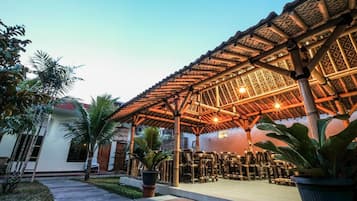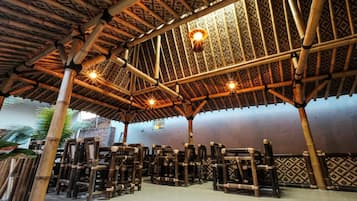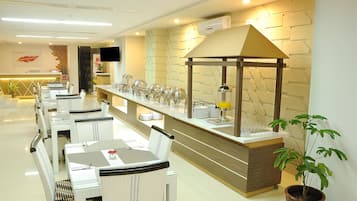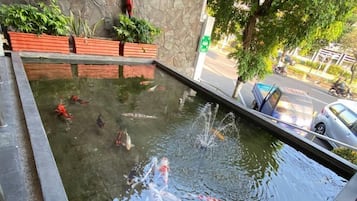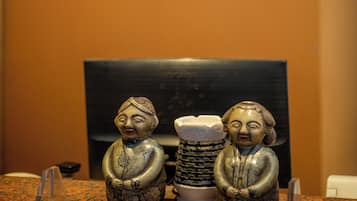Photo by Bien Nguyen

Find 3 Star Hotels in Pakualaman from AED 53
- Change your mindBook hotels with free cancellation
- Be pickySearch almost a million properties worldwide
Check availability on Pakualaman 3 Star Hotels
Our top choices for Pakualaman 3-star hotels
The price is AED 87
AED 106 total
includes taxes & fees
18 Jan - 19 Jan

8.0 out of 10, Very Good, (65 reviews)
The price is AED 74
AED 90 total
includes taxes & fees
23 Jan - 24 Jan

7.8 out of 10, Good, (6 reviews)
The price is AED 46
AED 56 total
includes taxes & fees
19 Jan - 20 Jan
The price is AED 101
AED 122 total
includes taxes & fees
21 Jan - 22 Jan
The price is AED 61
AED 75 total
includes taxes & fees
18 Jan - 19 Jan

8.6 out of 10, Excellent, (461 reviews)
The price is AED 175
AED 215 total
includes taxes & fees
19 Jan - 20 Jan

Griya Persada Convention Hotel & Resort Kaliurang
Griya Persada Convention Hotel & Resort KaliurangPakem
9.0 out of 10, Wonderful, (6 reviews)
The price is AED 140
AED 171 total
includes taxes & fees
15 Feb - 16 Feb
Save an average of 15% on thousands of hotels when you're signed in
Explore similar 4-star hotels
Many 4-star hotels have the same amenities as 3-star hotels. See all 4-star hotels in Pakualaman.

Hyatt Regency Yogyakarta
Jalan Palagan Tentara Pelajar Ngaglik Yogyakarta
The price is AED 250 per night from Jan 18 to Jan 19
AED 250
AED 302 total
18 Jan - 19 Jan
includes taxes & fees
9.2/10 Wonderful! (360 reviews)
Still don't see what you're looking for?
See all properties in Pakualaman.
You can also use these popular filters to refine your search.
Lowest nightly price found within the past 24 hours based on a 1 night stay for 2 adults. Prices and availability subject to change. Additional terms may apply.
Learn more about Pakualaman
Relaxing Pakualaman is calling! Discover its castle, cafes, gardens, and more.

Photo by Bien Nguyen
Open Photo by Bien Nguyen
Top Pakualaman Hotel Reviews

1O1 STYLE Yogyakarta Malioboro
10/10 Excellent

Puri Pangeran Hotel Yogyakarta
8/10 Good
Explore a world of travel with Expedia
Pakualaman Hotels by Star Rating
Hotels in Pakualaman Neighborhoods
Stay near popular Pakualaman attractions
- Hotels near Pakualaman Palace
- Hotels near Malioboro Street
- Hotels near Borobudur Temple
- Hotels near Prambanan Temple
- Hotels near Malioboro Mall
- Hotels near Tugu Yogyakarta
- Hotels near Jogja City Mall
- Hotels near Alun Alun Kidul
- Hotels near Parangtritis Beach
- Hotels near Gembira Loka Zoo
- Hotels near Gadjah Mada University
- Hotels near Plaza Ambarrukmo
- Hotels near Taman Sari
- Hotels near Pasar Beringharjo
- Hotels near Pasar Ngasem
- Hotels near Royal Palace of Yogyakarta
- Hotels near Candi Pawon
- Hotels near Islamic University of Indonesia
- Hotels near Svargabumi Borobudur
- Hotels near Maguwoharjo Stadium
More Hotel Options in Pakualaman
- Business Hotels in Pakualaman
- Cheap Hotels in Pakualaman
- Family Hotels in Pakualaman
- Golf Hotels in Pakualaman
- Historic Hotels in Pakualaman
- Hotel Wedding Venues in Pakualaman
- Hotel with a Concierge in Pakualaman
- Hotels with Bars in Pakualaman
- Hotels with Free Parking in Pakualaman
- Hotels with Hot Tubs in Pakualaman
- Hotels with WiFi in Pakualaman
- Hotels with a Pool in Pakualaman
- Hotels with an Indoor Pool in Pakualaman
- Hotels with smoking rooms in Pakualaman
- Luxury Hotels in Pakualaman
- Resorts & Hotels with Spas in Pakualaman
- Romantic Hotels in Pakualaman
- Shopping Hotels in Pakualaman
More Accommodation Types in Pakualaman
- Guest Houses in Pakualaman
- Apartments in Pakualaman
- Villas in Pakualaman
- Hostels in Pakualaman
- Vacation Homes in Pakualaman
- B&B in Pakualaman
- Resorts in Pakualaman
- Aparthotels in Pakualaman
- RV Parks in Pakualaman
- Cabin Rentals in Pakualaman
- Cottages in Pakualaman
- Lodges in Pakualaman
- Motels in Pakualaman
- Residences in Pakualaman
- Capsule Hotels in Pakualaman
- Holiday Park Resorts in Pakualaman
Explore more hotels
- Hotel Tentrem Yogyakarta
- Dparagon Malioboro
- Melia Purosani Yogyakarta
- Platinum Adisucipto Hotel & Conference
- Gallery Prawirotaman Hotel
- Greenhost Boutique Hotel
- Hotel Neo Malioboro by ASTON
- Swiss-Belboutique Yogyakarta
- The Manohara Hotel Yogyakarta
- The Jogja Malioboro Hotel and Conference Center
- HUBS Hostel Yogyakarta
- Harper Malioboro Yogyakarta by ASTON
- D'Kalpa Hotel Demangan Yogyakarta
- ibis Styles Yogyakarta
- Villa Borobudur Resort
- Plataran Heritage Borobudur Hotel
- ibis Yogyakarta Adi Sucipto
- GRAMM HOTEL by Ambarrukmo
- Hotel Le Temple
- Grand Tjokro Yogyakarta


















